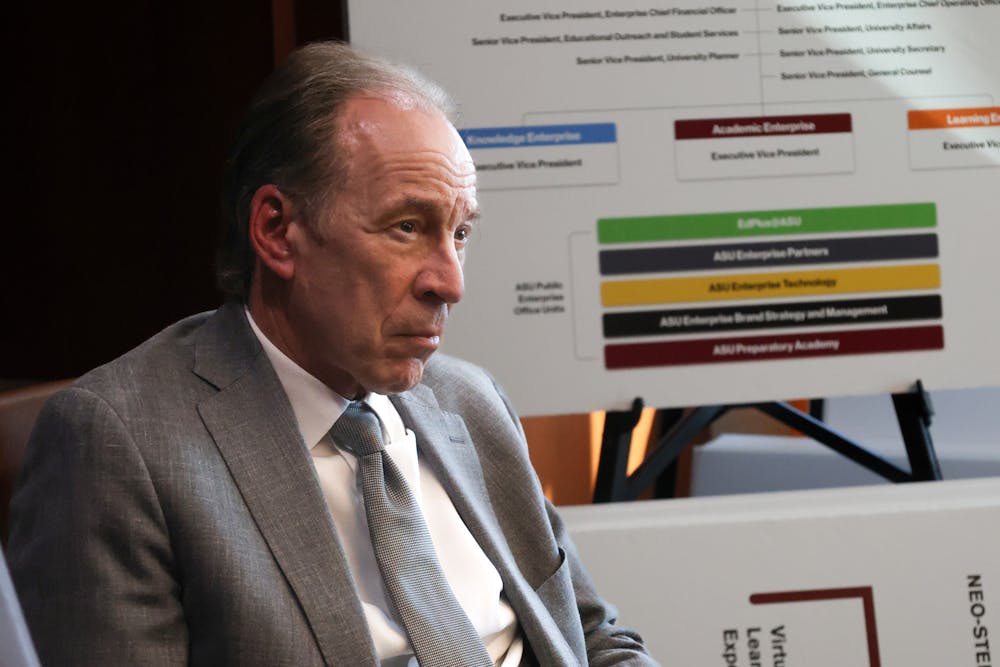In a meeting with The State Press on Thursday, March 21, University President Michael Crow spoke about reforming the athletics department, the importance of faculty compliance with DEI training and the AI systems that the University is implementing.
Status of the new athletic director and athletic department
It’s been over four months since Ray Anderson resigned from his position as ASU's athletic director, and the University has yet to hire his replacement. Amid other schools like UA firing and hiring a new AD within that time frame, Crow made it clear that the delay in hiring Anderson’s successor is more about restructuring the whole athletic department rather than just bringing in a new AD.
READ MORE: Ray Anderson steps down as ASU athletic director
"We're done with the historical model of athletics being an auxiliary, adjunct enterprise institution where … the athletic department has borrowed money from the University in support of our athletes," Crow said. "We want ASU athletics to be as much a part of the University as any other part of the University, that is, operating the way everything else operates. We’re doing away with a legacy in the design that we think is counterproductive to our success."
In the revamping of ASU athletics, Crow described changes to different parts of the department, such as the financial and operational models on which it's built. He said the model would more closely resemble the athletic departments of institutions like Stanford, Vanderbilt and Northwestern.
Only after the new system of the department is built will ASU bring in the new AD so they can focus primarily on the success of the teams, coaches and athletes rather than worrying about the "long-term financial structure of the football stadium."
"What we're doing is we're changing the financial structure of athletics in the University so that when the new athletic director comes in, the old system won't exist anymore – and we're just about done," Crow said.
He said the new model is expected to be finished this semester, and the new athletic director will be hired "very quickly" following the completion of the new model for the department.
Concerns with Big 12 move
Alongside the athletic department's internal changes, the University continues to transition to the Big 12 Conference after this spring season. Crow said this has proved challenging at certain points.
"There (are) always challenges because the world above the conferences is swirling at tornadic speed with so many things that are going on, with the imminent collapse of cable as the principal sports delivery mechanism (and) the rise of the Big Ten and the SEC as mega conferences," Crow said.
READ MORE: ASU, UA leaving Pac-12, joining the Big 12 conference
One of the big issues in transferring conferences is the financial sustainability of all 24 ASU varsity sports, as costs will increase when joining the Big 12.
Only the football and men’s basketball teams "make more money than they cost," while women’s basketball — a sport whose funding is required by Title IX — is the largest revenue loss at around $5 million, according to Crow.
"We have to look at the finances of everything. We're not going to make an immediate assessment," Crow said. "We have to see what’s the solution for … other sports that are emerging. Where we have our most significant issue, relative to the specifics of the issue of sports, is delivering competitiveness at a level that … other fans want to watch. That's really, really important, and then trying to figure out how to pay for it."
The Big 12 move also comes with an increase in media money — or at least, that's Crow's expectation.
He said the University is anticipating more revenue from the Big 12 than they have made in the Pac-12. However, the total Big 12 revenue is "undetermined" and based on media contracts in the future.
"Our hope is to use that revenue to pay for the athletic programs just the same way that we use tuition revenue to pay for our academic programs," Crow said.
The Goldwater Institute lawsuit over DEI training at the University
Crow said the Goldwater Institute lawsuit against ABOR regarding DEI training at ASU is rooted in things that are not true, and the University would push back against the lawsuit.
"We plan on objecting and fighting this lawsuit with everything that we have, it’s not based on facts," Crow said. "(For) The Goldwater Institute, I'm not sure, other than fundraising, what the objective is."
READ MORE: Goldwater Institute sues ABOR on professor's behalf over DEI training at ASU
Crow was then asked how the University planned to uphold its commitment to fostering an inclusive and equitable learning environment.
"You phrased the question as if we've got to uphold something. I mean, it's who we are," Crow said.
AI will be implemented in many ways across the University
Crow said the University is exploring different ways ASU could implement AI.
"So one of the AI applications that we're looking at is: 'Could we build an AI tool that can be a tutor?'" Crow said.
In January, ASU announced it would be the first higher education institution to partner with OpenAI.
READ MORE: ASU announces first partnership between OpenAI and a University
Crow said as the University begins to use AI in different fashions, students shouldn’t worry about their data privacy. Crow also said that when he asks AI questions, he doesn’t necessarily know what happens to that information.
"Nothing changes relative to the protection of our students' privacy," Crow said. "I don't know what (AI does) with those questions, I don't really care either. But on the privacy, nothing's changing."
Edited by Grey Gartin, Sadie Buggle and Angelina Steel.
Reach the reporters at alysa.horton@gmail.com and whsmith8@asu.edu and follow @alysa_horton and @walkerrTR on X.
Like The State Press on Facebook and follow @statepress on X.
Alysa is a senior studying journalism and mass communication with a minor in political science. This is her fifth semester with The State Press. She has also worked at The Arizona Republic.

Walker Smith is a former managing editor in the digital department of The State Press and is an ASU alum. He has previously worked as a reporter and editor on the sports desk and works for Blaze Radio and interned at Big Slate Media in broadcast productions.





